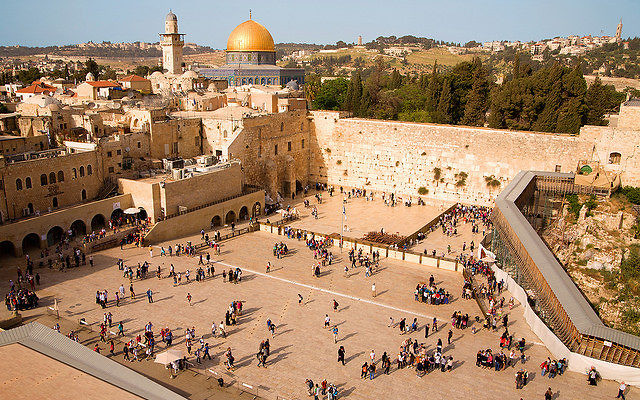Lamentations: Looking Toward the Light

The three weeks leading up to Tisha B’Av, including the nine days we’re now experiencing, are the saddest time on the Jewish calendar. Yet this past Shabbat I heard two rabbis speak about the importance of being happy and looking for the good.
When I was a 21-year-old drama leader at Camp Milldale in Baltimore a trillion years ago, I remember hearing about the nine days and Tisha B’Av from the other JCC counselors. Although I wasn’t observant yet, I decided that, like them, I wouldn’t eat meat during the nine days (I didn’t know that on Shabbat I could have eaten meat).
This year, the fast of Tisha B’Av, the 9th of Av, is actually pushed off to Sunday, the 10th of Av, because the 9th falls on Shabbat. We never mourn on Shabbat.
Many tragedies happened on Tisha B’Av: The First and Second Temples in Jerusalem were destroyed. The Jews were expelled from England in 1290 and from Spain during the Inquisition in 1492. World War I began on the 9th of Av. The deportation of Jews from the Warsaw Ghetto also happened on this infamous day.
In the Bible, after surveying the land of Israel, the spies came back on the 9th of Av with a bad report. Because of this, the Jews had to wander in the desert for 40 years.
What’s so terrible about crying over a land with giants they thought they couldn’t conquer? The reason is that after seeing how Hashem miraculously brought them out of Egypt, split the Red Sea and gave them the Torah at Mount Sinai, the Jews still didn’t believe that G-d would help them conquer the land. They didn’t see the good.
In a sermon on Shabbat morning at Beth Jacob, Rabbi Gidon Moskovitz, visiting from Houston, began by saying, “The sun never sees the dark side of the moon.” He related this to the parsha, which Moses, the greatest prophet who ever lived, wasn’t allowed into the Promised Land because, as many commentators point out, he struck the rock for water instead of speaking to it as G-d had commanded.
The rabbi shared another commentary that says the reason Moses couldn’t go into the land was because he called the Jews rebels. Not rebellious, but rebels.
The rabbi connected this idea to the sun never seeing the dark side of the moon. If Moses would have called the Jews rebellious, that would have been OK, but G-d said, “You called My people rebels.” This teaches us to avoid labels and keep looking for the good.
Shabbat afternoon, I attended a special lecture for women by Rabbi Shmuel Khoshkerman of Congregation Ner Hamizrach. He said everyone should be dancing around full of simcha. It was strange to hear this during the nine days.
The rabbi explained that at the start of the month of Adar, when Purim is celebrated, we’re told to increase our simcha. Then at the start of Av, we’re told to decrease our simcha. “That doesn’t mean we shouldn’t have simcha during this time,” Rabbi Khoshkerman said, just less simcha.
I asked, “What about Tisha B’Av?” He answered that it’s OK to cry on Tisha B’Av for the loss of the Temples, but have simcha that we know what we’re crying about.
There’s a famous story that happened in 1967 when a group of IDF soldiers captured the Kotel during the Six Day War. One observant soldier was crying, and one who wasn’t observant was also crying. The nonobservant Jew asked his friend, “Why are you crying?”
The religious soldier answered that he was crying because they had recaptured the Kotel. The observant Jew then asked his friend, who often mocked observance, “Why are you crying?”
“I’m crying,” the other soldier said, “because I don’t know what there is to cry about.”
This Sunday, Aug. 14, I’ll spend the day in shul crying for the holy Temples but not with despair — never with despair. I know that G-d is always there for all of us, even in the dark times. We just have to keep looking toward the light.



comments